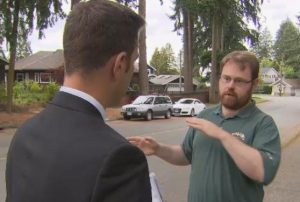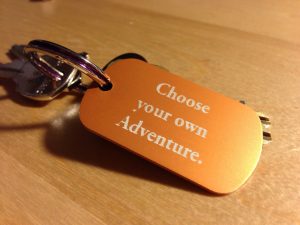In my last blog, I talked about being a drama teacher. The theme of my time in this CFE has emerged for me in this blog post – it’s been about helping students find their voice.
I’ve had the opportunity to do news interviews a few times over the course of my travels. Mostly, they have been about events I’ve helped organize – Arts County Fair, a giant end of school rock concert that used to be UBC’s signature student event, Geek Week (a festival celebrating science) at SFU, that kind of thing. On a couple of occasions, I’ve been asked to comment on my area of expertise – student recruitment, advising and retention at universities. This year, through some random coincidence, I’ve been interviewed outside each of my practicum schools.
Both have had to do with a tendency I have to ask uncomfortable questions about decisions I don’t think are warranted. The first one was on Translink’s proposed cancellation of the UBC Express service from West Vancouver. Translink was using ‘cost per passenger boarding’ to compare the relative cost of routes. On this measure, an express line with very few stops where people take a long trip is always going to look bad against a line like the #5 Davie St. bus downtown with lots of stops and passengers that travel short distances. I argued publicly that Translink should be using cost per passenger kilometre. This is a harder measure to capture, but asks the right question: ‘how much does it cost to move a given number of people a given distance?’. I also argued that Translink should place some value on peoples’ time as they made their decision – if you ask travellers to spend, collectively, thousands more hours per years on the bus, this should have an overall benefit to society or the system that outweighs the cost imposed on affected individuals. Ultimately, Translink chose to rethink their plans. I was very discreet about the interview at my practicum school – it was during on of my Thursday visits in the fall and I didn’t know whether the school culture would welcome it, so discretion seemed the best option.
This week, I was interviewed by CTV on Vancouver school closures. This came out of the demographic analysis I posted on my blog and the fact that a classmate from my undergrad went on to become a reporter and thought the information added something to the conversation. Again, it was a question of using my previous expertise in enrolment planning for universities to approach the questions in a way I didn’t see represented in the public debate. I was gratified that the following day on CBC radio, the minister of education was interviewed on the Early Edition and answered a question about why school closures were justified by citing declining enrolments in Vancouver. The follow up question was pretty much a direct quote of my blog ‘but aren’t school aged populations set to increase starting this year’. The conversation changed just a little bit at that moment and the premise behind the policy direction was weakened. This was a ‘win’ because it meant that more relevant evidence was brought into the public sphere in the policy debate. This is an essential component for civil society.
So, where in all this is my CFE? Well, it turns out I was a lot less discreet this time around. A class was doing an outdoor activity a few feet away from the interview. A fair number of kids at the school saw the interview on the news. It also turns out the grade 4 class I was working with on coding was watching the whole time from their second story window. When I arrived the next day to teach coding, they all wanted to know why the news wanted to talk to me.
I decided on the spot to teach a mini lesson and I think it sums up what I’ve learned about the IB experience well. I started with a pretty open ended question: “why is learning math and social studies important?” The answers were interesting. Mostly they had understood that this learning somehow connected to their self-interest. They pretty much all cited variations on ‘I will be able to use them to get a job and earn money’.
From there, I went on to frame my blog as my own personal Unit of Inquiry. The inquiry question was: ‘are school closures in Vancouver the right thing to do?’ I told them I gathered evidence to understand my question. I drew the direct connection for them the idea that I used the social studies and math skills to answer this question. I then framed my blogging about it and my interview as my action taken based on my inquiry. A whole inquiry question, research and action cycle completed in 3 days.
From there, I pointed out that math and social studies skills not only help us have jobs and make money for ourselves, they are also an essential part of how we can each be citizens. This example, the curiosity piqued by the unusual event of a student teacher being interviewed by the news, led to the opportunity to show concretely that social studies and math are tools for citizenship. Sharing your views to a news reporter is not just an avenue of citizenship open to those with fancy titles or famous people. It can be anyone with curiosity, the ability to frame questions, the math and social studies skills to give better insight into the issue, and the speaking skills to communicate about it. I also told them about how I made a mistake during the interview (I got one of the numbers wrong on the first pass at answering a question) and had to look up the numbers I was quoting to be sure – reinforcing the fact that mistakes are a fact of life and that it is always possible to fix them. For some it was the first time they realized that an interview on the TV wasn’t live and you could go back and answer again, even though the camera was rolling.
And so, in that 20 minutes or so, I was able to role model how the IB inquiry process can be used in the real world to impact an issue that you care about. It was also a great real-time test of my understanding of the IB inquiry process which I’d been exposed to over the course of the three weeks at the school.
So, when reflecting back on my main goal as a learner – getting a better understanding and fluency of the IB program, I think I’ve managed to achieve it. If, along the way, I’ve helped students in the school see how they can engage in a bigger discussion as a citizen, and how the tools of IB are not limited to the petrie dish of the school curriculum; that their thinking skills and their voice are the essential two elements of citizenship, then that means I’ve met my goal as a teacher as well. The teaching I’ve done, whether in music with the Ks, drama and poetry with the 6s, or inadvertent lessons with the 4s, shares that theme.
To this point, my teaching philosophy has been that my role is to help students become more sophisticated in their view of themselves and the world. My experience in the IB program, with its focus on identifying actions that arise from that sophistication, has pushed my philosophy. Students also need to be supported in finding their voice – defined very broadly – as well.




